![]()

The Eternal City (1915)
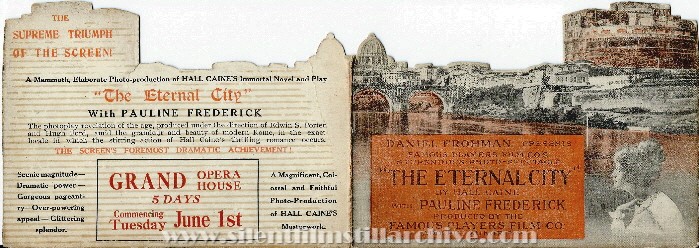
DANIEL FROHMAN presents
FAMOUS PLAYERS FILM CO'S STUPENDOUS PHOTO-SPECTACLE
"THE ETERNAL CITY"
BY HALL CAINE
with PAULINE FREDERICK
PRODUCED BY THE
FAMOUS PLAYERS FILM CO.
ADOLPH ZUKOR, Pres.
THE SUPREME TRIUMPH OF THE SCREEN!
A Mammoth, Elaborate Photo-production of HALL CAINE'S Immortal Novel and Play
"The Eternal City"
with PAULINE FREDERICK
The photoplay revelation of the age, produced under the direction of Edwin S. Porter and Hugh Ford, amid the grandeur and beauty of Modern Rome, in the exact locale in which the stirring action of Hall Caine's thrilling romance occurs.
THE SCREEN'S FOREMOST DRAMATIC ACHIEVEMENT!
GRAND OPERA HOUSE
5 DAYS
Commending
Tuedsay, June 1st
Scenic magnitude -- Dramatic power -- Georgeous pageantry -- over-powering appeal -- Glittering splendor.
A Magnificent, Colossal and Faithful Photo-Production of HALL CAINE's Masterwork.
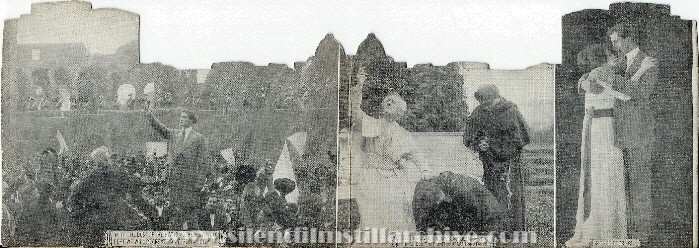
With the dust of the Nations beneath our feet, we will recreate an eternal city!
"Love has saved you, my daughter and love is the bridge that unites heaven and earth."
Peace Eternal
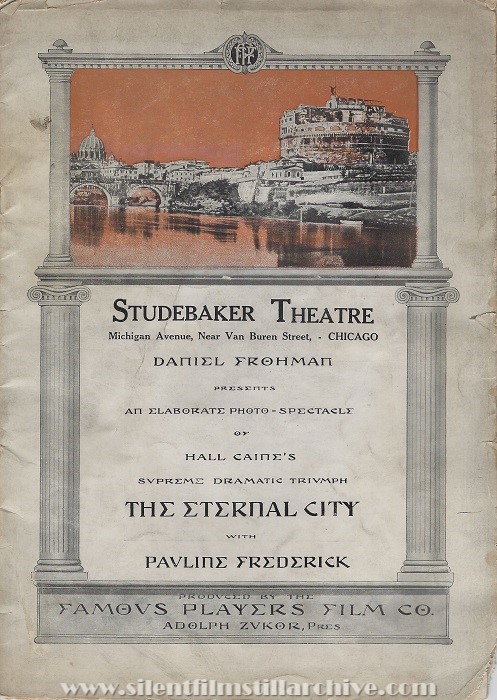
STUDEBAKER THEATRE
Michigan Avenue, Near Van Buren
Street, - CHICAGO
DANIEL FROHMAN
presents
AN ELABORATE PHOTO-SPECTACLE
of
HALL CANE'S
Supreme Dramatic Triumph
THE ETERNAL CITY
with
PAULINE FREDERICK
Produced by the
FAMOUS PLAYERS FILM CO.
ADOLPH ZUKOR, Pres.
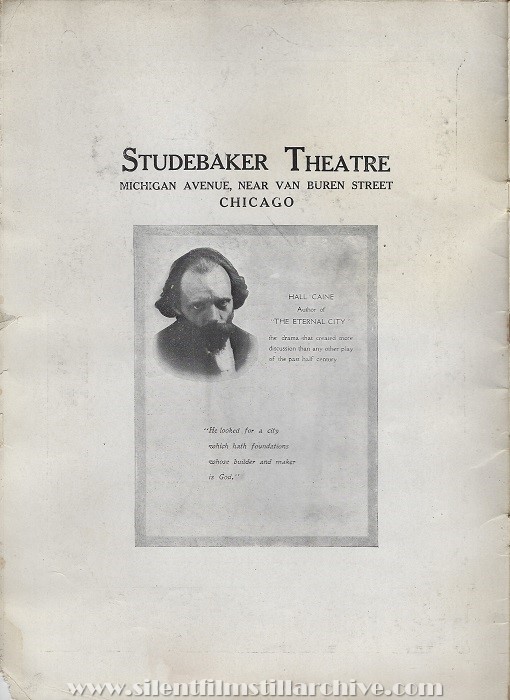
STUDEBAKER THEATRE
MICHIGAN AVENUE, NEAR VAN BUREN
STREET
CHICAGO
HALL CAINE
Author of
"THE ETERNAL CITY"
the drama
that created more disussion than any other play of the past half century.
"He looked for a city which hath foundations whose builder and maker is God."
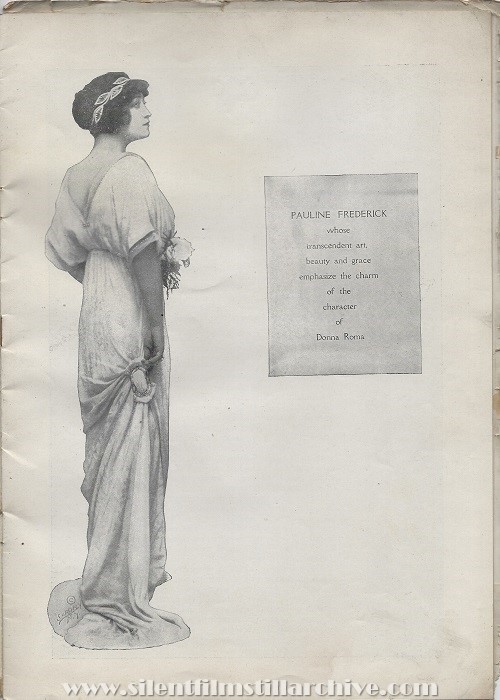
PAULINE FREDERICK
whose transcendent art, beauty and grace emphasize
the charm of the character of Donna Roma.
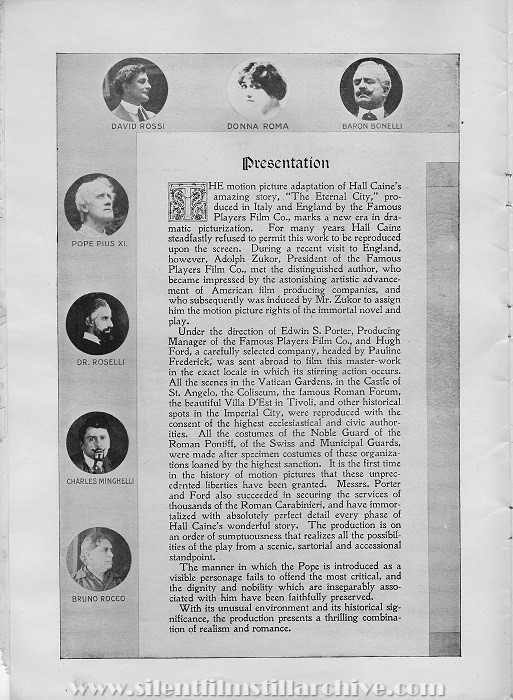
Presentation
THE motion picture adaptation of Hall Caine's amazing story, "The Eternal City," produced in Italy and England by the Famous Players Film Co., marks a new era in dramatic picturization. For many years Hall Caine steadfastly refused to permit this work to be reproduced upon the screen. During a recent visit to England, howeer, Adolph Zukor, President of the Famous Players Film Co., met the distinguished author, who became impressed by the astonishing artistic advancement of American film producing compaies, and who subsequently was induced by Mr. Zukor to assign him the motion picture rights of the immortal novel and play.
Under the direction of Edwin S. Porter, Producing Manager of the Famous Players Film Co., and Hugh Ford, a carefully selected company, headed by Pauline Frederick, was sent abroad to film this master work in the exact locale in which its stirring action occurs. All the scenes in the Vatican Gardens, in the Castle of St. Angelo, the Coliseum, the famous Roman Forum, the beautiful Villa D'Est in Tivoli, and other historical spots in the Imperial City, were peproduce with the consent of the highest ecclesiastical and civic authorities. All the costumes of the Noble Guard of the Roman Pontiff, of the Swiss and Municipal Guards, were made after specimen costumes of these organization loaned by the highest sanction. It is the first time in the history of motion pictures that these unprecedented liberties have been granted. Messrs. Porter and Ford also succeeded in securing the serives of thousands of Roman Carabinieri, and hav eimmortalized with absolutely perfect detail every phase of Hall caine's wonderful story. The production is on an order of sumptuousness that realizes all the possibilities of the play from a scenic, sartorial and accessional standpoint.
The manner in which the Pope is introduced as a visible personage fails to offend the most critical, and the dignity and nobility which are inseparably associated with him have been faithfully preserved.
With the unusual environment and its historical significance, the production presents a thrilling combination of realism and romance.
DAVID ROSSI DONNA
ROMA BARON BONELLI
POPE PIUS XI DR. ROSELLI
CHARLES MINGHELLI
BRUNO ROCCO
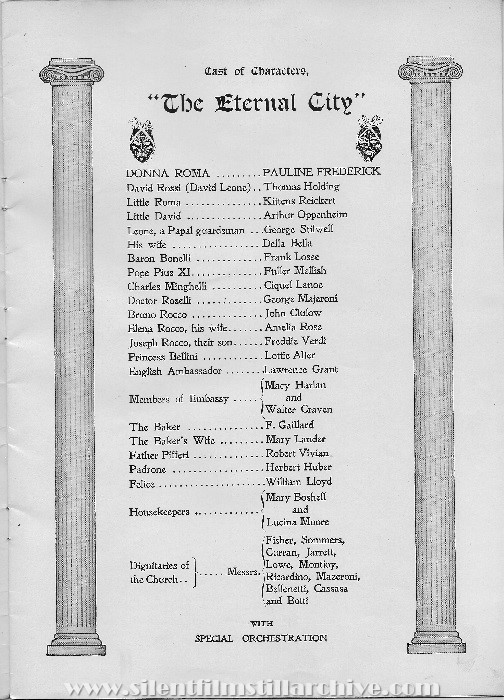
Cast of Characters,
"The Eternal City"
| DONNA ROMA | PAULINE FREDERICK |
| David Rossi (David Leone) | Thomas Holding |
| Little Roma | Kittens Reickert |
| Little David | Arthur Oppenheim |
| Leone, a Palal guardsman | George Stilwell |
| His wife | Della Bella |
| Baron Bonelli | Frank Losee |
| Pope Pius XI | Fuller Mellish |
| Charles Minghelli | Ciquel Lanoe |
| Docor Roselli | George Majeroni |
| Bruno Rocco | John Clulow |
| Elena Rocco, his wife | Amelia Rose |
| Joseph Rocco, their son | Freddie Verdi |
| Princess Bellini | Lottie Alter |
| English Ambassador | Lawrence Grant |
| Members of Embassy | Macy Harlan and Walter Craven |
| The Baker | F. Gaillard |
| The Baker's Wife | Mary Lander |
| Father Pifferi | Robert Vivian |
| Padrone | Herbert Huber |
| Felice | William Lloyd |
| Housekeepers | Mary Boshell and Lucina Moore |
| Dignitaries of the Church | Messrs. Fisher, Sommers, Curran, Jarrett, Lowe, Montjoy, Ricardino, Mazeroni, Bellenetti, Cassasa and Botti |
with SPECIAL ORCHESTRATION
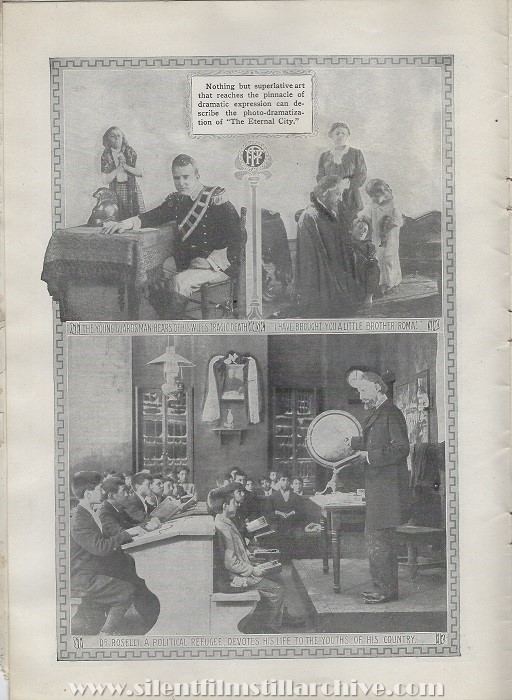
Nothing but superlative art that reaches the pinnacle of darmatic expression can describe the photo-dramatization of "The Eternal City."
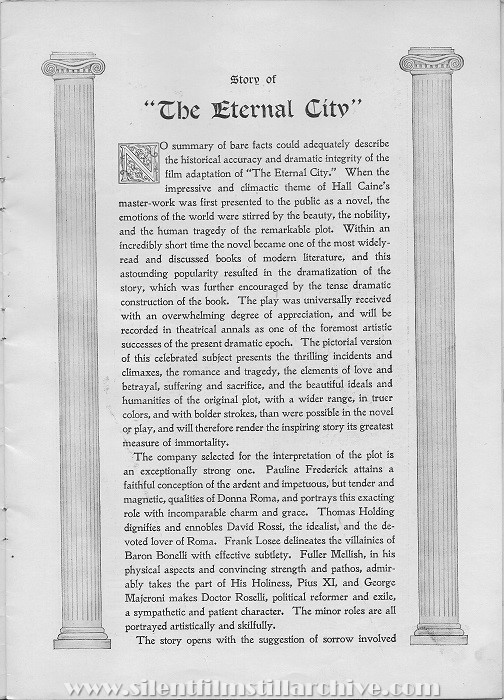
Story of
"The Eternal City"
NO summary of bare facts could adeuately describe the historical accuracy and dramatic integrity of the film adaption of "The Eternal City. When the impressive and climactic theme of Hall Caine's master-work was first presented to the public as a novel, the emotions of the world were stirred by the beauty, the nobility and the human tragedy of the remarkable plot. Within an incredibly short time the novel became one of the most widely-read and discussed books of modern literature, and this astounding opularity resulted in the dramatization of the story, which was further encouraged by the tense dramatic construction of the book. The play was universally received with an overwhelming degree of appreciation, and will be recorded in theatrical annals as one of the foremost artistic successes of the present dramatic epoch. The pictorial version of this celebrated subject presents the thrilling incidents and climaxes, the romance and tragedy, the elements of love and betrayal, suffering and sarifice, and the beautiful ideals and humanities of the original plot, with a wider range, in truer colors, and with bolder strokes, than were possible in the novel or play, and will therefore render the inspiring story its greatest measure of immortality.
The company selected for the interpretation of the plot is an exceptionally strong one. Pauline Frederick attains a faithful conception of the ardent and impetuous, but tender and magnetic, qualitites of Donna Roma, and portrays this exacting role with incomparable charm and grace. Thomas Holding dignifies and ennobles David Rossi, the idealist, and the devoted lover of Roma. Frank Losee delineates the villainies of Baron Bonelli with effective subtlety. Fuller Mellish, in his physical aspects and convincing strength and pathos, admirably takes the part of His Holiness, Pius XI, and George Majeroni makes Doctor Roselli, political reformer and exile, a sympathetic and patient character. The minor roles are all portrayed artistically and skilfully (sic).
The story opens with the suggestion of sorrow involved
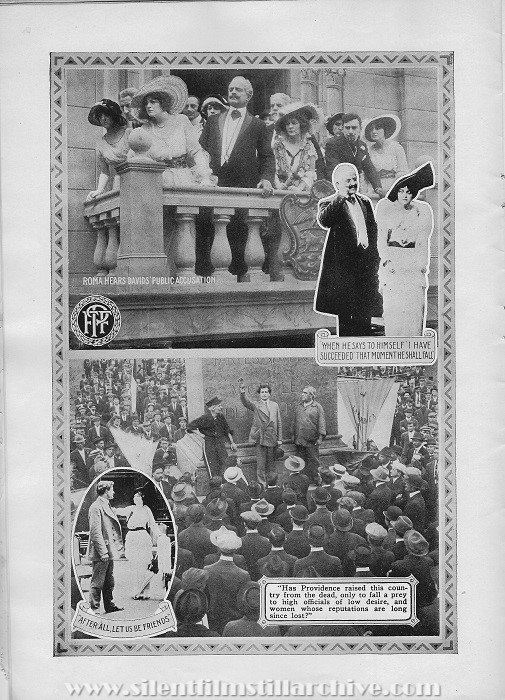
Roma Hears David's Public Accusation
Whe He Says to Himself "I Have Succeeded" That Moment He Shall Fail
"After All, Let Us Be Friends."
"Has Proidence raised this country from the dead, only to fall a prey to high officials of low desire, and women whose reputations are long since lost?"
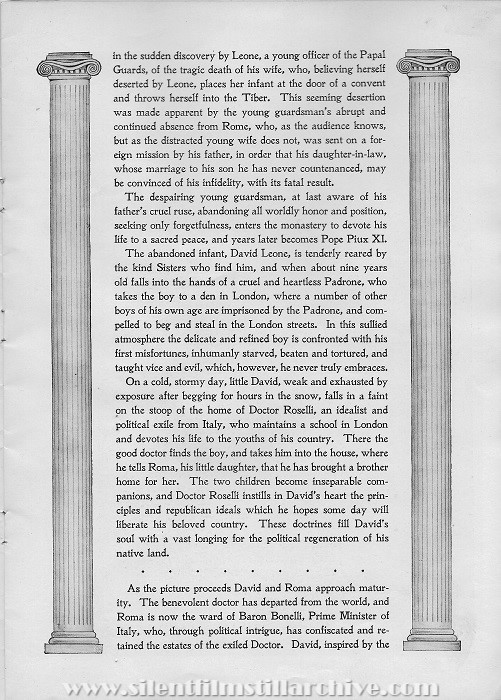
in the sudden discovery by Leone, a young officer of the Papal Guards, of the tragic death of his wife, who, believing herself deserted by Leone, places her infant at the door of a convent and throws herself into the Tiber. This seeming desertion was made apparanet by the young guardsman's abrupt and continued absence from Rome, who, as the audience knows, but as the distraced young wife does not, was sent on a foreign mission by his father, in order that his daughter-in-law, whose marriage to his son he has never countenanced, my be convinced of his infidelity, with its fatal result.
The despairing young guardsman, at last aware of his father's cruel ruse, abandoning all worldly honor and position, seeking only forgetfulness, enters the monastery to devote his life to a sacred peace, and years later becomes Pope Piux XI (sic).
The abandoned infant, David Leone, is tenderly reared by the kind Sisters who find him, nd when about nine years old falls into the hands of a cruel and heartless Pdrone, who takes the boy to a den in London, where a nuber of other boys of his own age are imprisoned by the Padrone, and compelled to beg and steal in the London streets. In this sullied atmoshere the delicate and refined boy is confronted with his first misfortunes, inhmanly starved, beaten and tortured, and taught vice and evil, which, however, he never truly embraces.
On a cold, stormy day, little David, weak and exhausted by exposure after begging for hours in the snow, falls in a faint on the stoop of the home of Doctor Roselli an idealist and political exile from Italy, who maintains a chool in London and devotes his life to the youths of his country. There the good doctor finds the boy, and takes him into the house, where he tells Roma, his little daughter, that he has brought a brother home for her. The two children become inseparable companions, and Doctor Roselli instills in David's heart the principles and republican ideals which he hopes some day will liberate his beloved country. These doctrines fill David's soul with a vast longing for the political regeneration of his native land.
As the picture proceeds Dvid and Roma approach maturity. The benevolent doctor has departed from the world, and Roma is now the ward of Baron Bonelli, Prime Minister of Italy, who, through political intrigue, has confiscated and retained the estates of the exiled Doctor. David, inspired by the
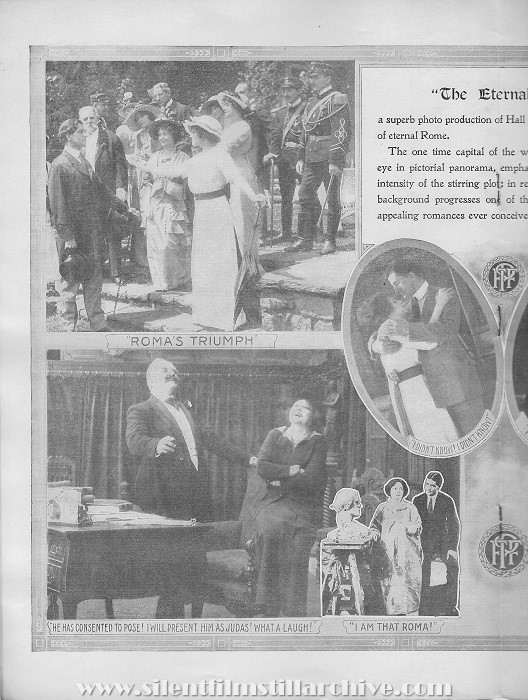
"The Eternal City"
a superb photo production of Hall Caine's brilliant drama of eternal Rome.
The one time capital of the world passes before the eye in pictorial panorama, emphasized by the dramatic intensity of the stirring plot,; in relief against this classic background progresses one of the most ingenious and appealing romances ever conceived.
ROMA'S TRIUMPH
"I DIDN'T KNOW! I DIDN'T KNOW!"
"HE HAS CONSENTED TO POSE! I WILL PRESENT HIM AS JUDAS! WHAT A LAUGH!"
"I AM THAT ROMA!"
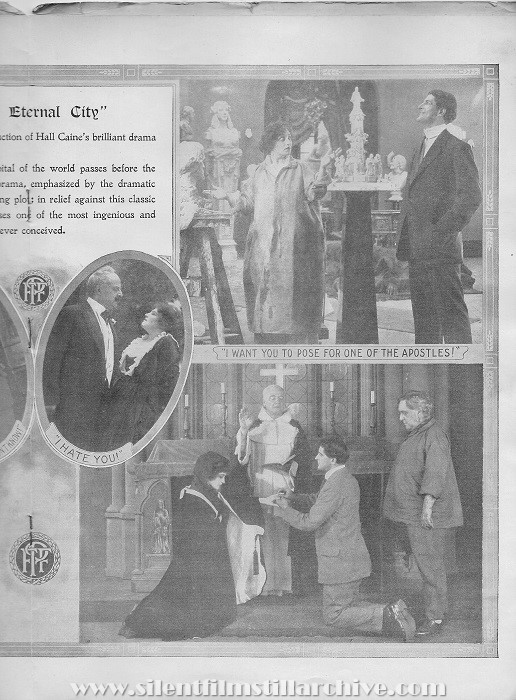
"I WANT YOU TO POSE FOR ONE OF THE APOSTLES!"
"I HATE YOU!"
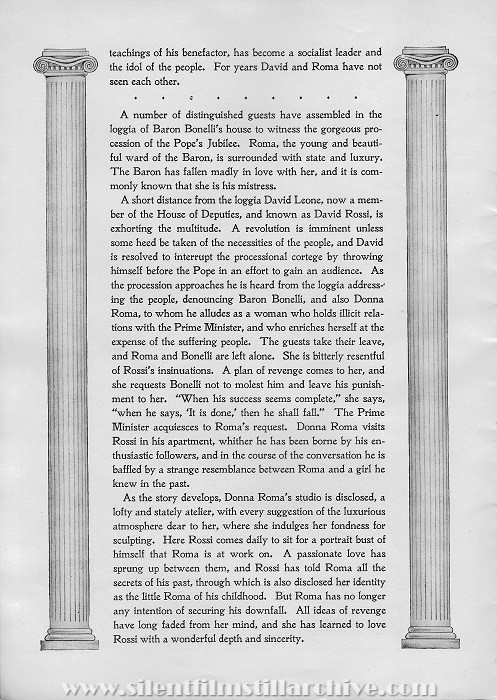
teachings of his benefactor, has become a socialist leader and the idol of the people. For years David and Roma have not seen each other.
A number of distinguished guests have assembled in the loggia of Baron Bonelli's house to witness the gorgeous procession of the Pope's Jubilee. Roma, the young and beautiful ward of the Baron, is surrounded with state and luxury. The Baron has fallen madly in love with her, and it is commonly known that she is his mistress.
A short distance from the loggia David Leone, now a member of the House of Deputies, and known as David Rossi, is exhorting the muktitude. A revolution is imminent unless some heed be taken of the necessitites of the people, and David is resolved to interrupt the processional cortege by throwing himself before the Pope in an effort to gain an audience. As the procession approaches he is heard from the loggia addressing the people, denouncing Baron Bonelli, and also Donna Roma, to whom he alludes as a woman who holds illicit relations with the Prime Minister, and who enriches herself at the expense of the suffering people. The guests take their leave, and Roma and Bonelli are left alone. She is bitterly resentful of Rossi's insinuations. A plan of revenge comes to her, and she requests Bonelli not to molest him and leave his punishment to her. "When his success seems complete," she says, "when he says, 'It is done.' then he shall fall." The Prime Minister acquiesces to Roma's request. Donna Roma visits Rossi in his apartment, whither he has een borne by his enthusiastic folowers, and in the course of the conversation he is baffled by a strange resemblance between Roma and a girl he knew in the past.
As the story develops, Donna Roma's studio is disclosed, a lofty and stately atelier, with every suggestion of the luxurious atmosphere dear to her, where she indulges her fondness for sculpting. Here Rossi comes daily to sit for a portrait bust of himself that Roma is at work on. A passionate love has sprung up etween them, and Rossi has told Roma all the secrets of his past, through which is also disclosed her identity as the little Roma of his childhood. But Roma has no longer any intention of securing his downfall. All ideas of revenge have long faded from her mind, and she has learned to love Rossi with a wonderful depth and sincerity.
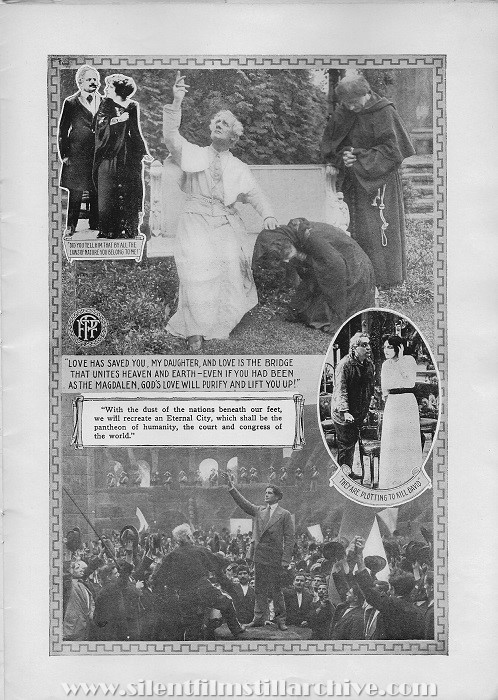
"Did You Tell Him That By All The Laws Of Nature You Belong To Me!"
"Love Has Save You, My Daughter, And Love Is The Bridge That Unites Heaven And Earth -- Even If You Had Been As the Magdalen, God's Love Will Purify And Lift You Up!"
"With the dust of the nations beneath our feet, we will recreate an Eternal City, which shall be the paneheon of humanity, the court and congress of the world."
"THEY ARE PLOTTING TO KILL DAVID"
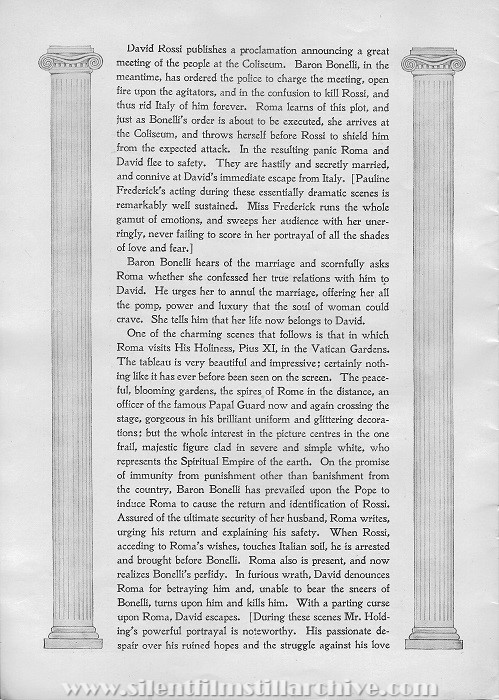
David Rossi publishes a proclamation announcing a great meeting of the people at the Coliseum. Baron Bonelli, in the meantime, has ordered the police to charge the meeting, open fire upon the agitators, and in the confusion to kill Rossi, and thus rid Italy of him forever. Roma learns of this plot, and just as Bonelli's order is about to be executed, she arrives at the Coliseum, and throws herself before Rossi to shield him from the expected attack. In the resulting panic Roma and David flee to safety. They are hastily and seretly married, and connive at David's immediate escape from Italy. [ Pauline Frederick's acting during these essentially dramatic scenes is remarkably well sustained. Miss Frederick runs the whole gamut of emotions, and sweeps her audience with her unerringly, never failing to score in her portrayal of all the shades of love and fear.]
Baron Bonelli hears of the marriage and scornfully asks Roma whether she confessed her true relations with him to David. He urges her to annul the marriage, offering her all the pomp, power and luxury that the soul of woman could crave. She tells him that her life now belongs to David.
One of the charming scenes that follows is that in which Roma visits His Holiness, Pius XI, in the Vatican Gardens. The tableau is very beautiful and impressive; certainly nothing like it has ever before been seen on the screen. The peaceful, blooming gardens, the spires of Rome in the distance, an officer of the famous Papal Guard now and again crossing the stage, gorgeous in his brilliant uniform and glittering decorations; but the whole interest in the picture centres in the one frail, majestic figure clad in severe and simple white, who represents the Spiritual Empire of the earth. On the primise of immunity from punishmet other than banishment from the country, Baron Bonelli has prevailed upon the Pope to induce Roma to cause the return and identification of Rossi. Assured of the ultimate security of her husband, Roma writes, urging his return and explaining his safety. When Rossi, acceding to Roma's wishes, touches Italian soil, he is arrested and brought before Bonelli. Roma lso is present, and now realizes Bonelli's perfidy. In furious wrath, David denounces Roma for betraying him and, unable to bear the sneers of Bonelli, turns upon him and kills him. With a parting curse upon Roma, David escapes. [During these scenes Mr. Holding's powerful portrayal is noteworthy. His passionate despair over his ruined hopes and the struggle against his love
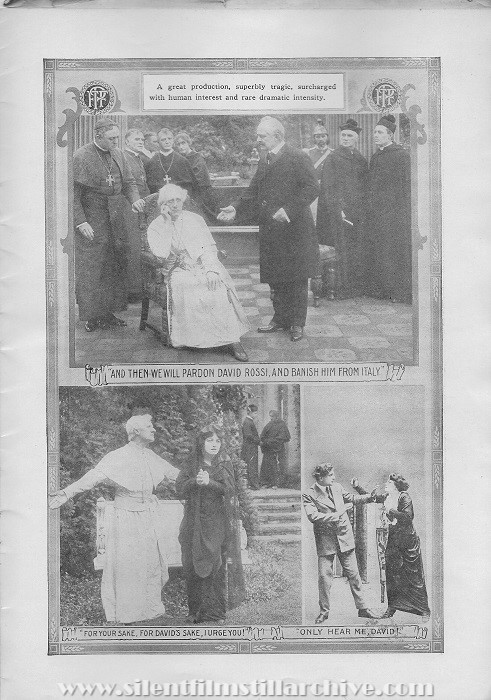
A great production, superbly tragic, surcharged with human interest and rare dramatic intensity.
"And Then We Will Pardon David Rossi, And Banish Him From Italy"
"For Your Sake, For David's Sake, I Urge You!"
"Only Hear Me, David!"
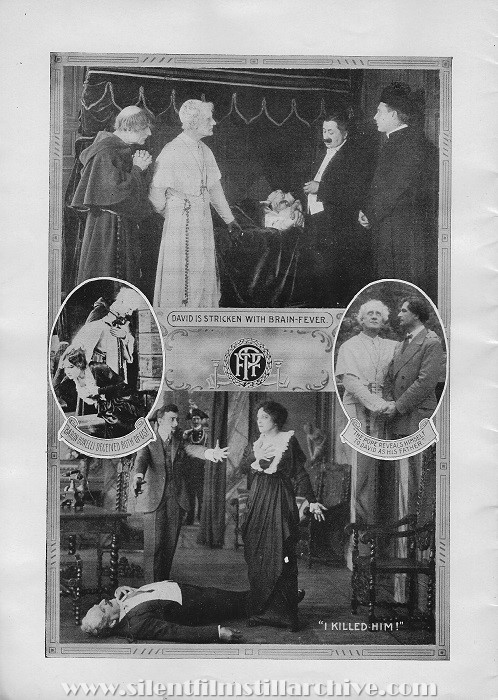
David Is Stricken With Brain Fever
Baron Bonelli Deceived Both of Us!
The Pope Reveals Himself to David As His Father.
"I Killed Him!"
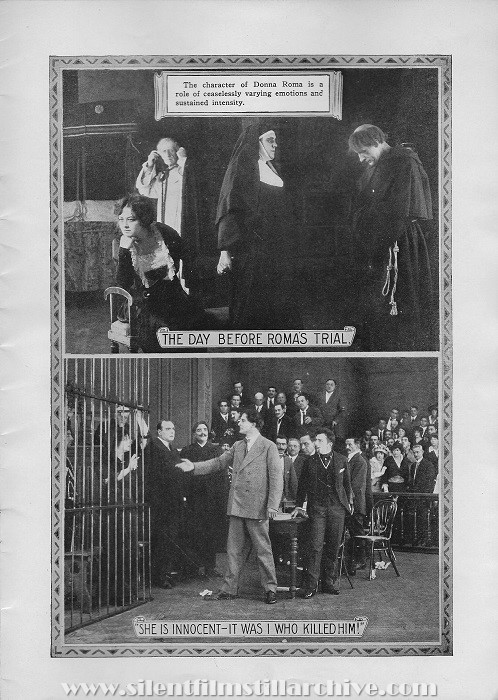
The character of Dona Roma is a role of ceaselessly varying emotions and sustained intensity.
The Day Before Roma's Trial
"She Is Innocent -- It Was I Who Killed Him!"
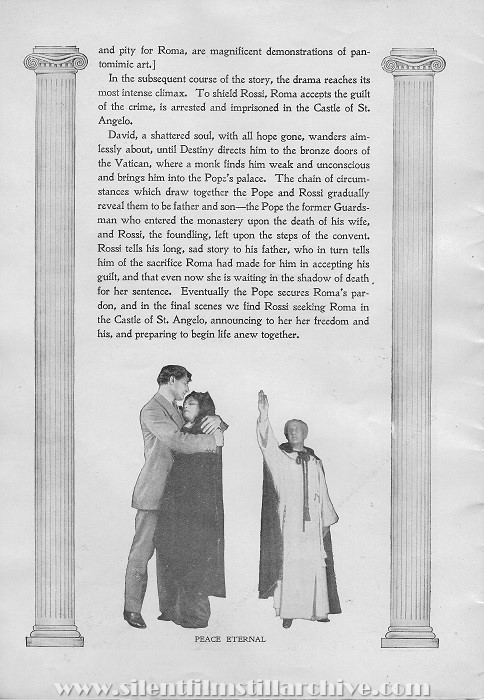
and pity for Roma, are magnificent demonstrations of pantomimic art.]
In the subsequent course of the story, the drama reaches its ost intense climax. To shield Rossi, Roma accepts the guilt of the crime, is arrested and imprisoned in the Castle of St. Angelo.
Dvid, a shattered soul, with all home gone, wanders aimlessly about, until Destiny directs him to the bronze doors of the Vatican, where a monk finds him weak and unconscious and brings him into the Pope's palace. The chain of circumstances which draw together the Pope and Rossi gradually reveal them to be father and son -- the Pope the former Guardsman who entered the monastery upon the death of his wife, and Rossi, the foundling, left upon the steps of the convent. Rossi tells his long, sad story to his father, who in turn tells him of the sacrifice Roma had made for him in accepting his guilt, and that even now she is waiting in the shador of death for his sentence. Eventually the Pope secures Roma's pardon, and in the final scenes we find Rossi seeking Roma in the Castle of St. Angelo, announcing to her her freedom and his, and reparing to begin life anew together.
PEACE ETERNAL.
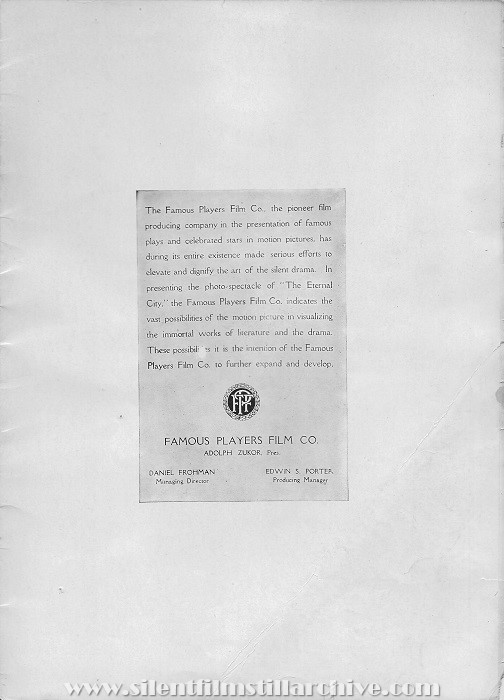
The Famous Players Film Co., the pioneer film producing company in the presentation of famous plays and celebrated stars in motion pictures, has during its entire existence made serious efforts to elevate and dignify the art of the silent drama. In presenting the phoeo-spectacle of "The Eternal City," the famous Players Film Co. indicates the vast possibilities of the motion picture in visualizine the immortal works of literature and the drama. These possibilities it is the intention of the Faous Players Film Co. to further expand and develop.
FPF
FAMOUS PLAYERS FILM CO.
Adolph Zukor, Pres.
Daniel Frohman
Edwin S. Porter
Managing Director
Producing Manager
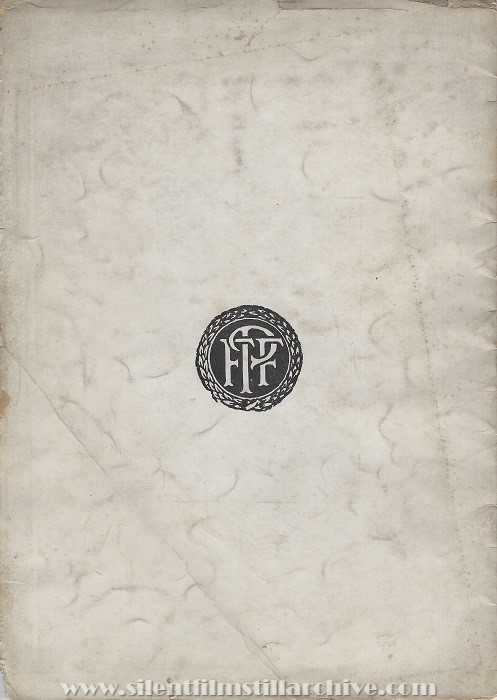
FPF
"The Eternal City"
The Eight-Part Famous Player's Adaptation of Hall Caine's
Story is a Great Production.
Reviewed by George Blaisdell.
CAST
|
Donna Roma |
Pauline Frederick |
|
David Rossi (David Leone) |
Thomas Holding |
|
Little Roma |
Kittens Reickert |
|
Little David |
Arthur Oppenheim |
|
Baron Bonelli |
Frank Losee |
|
Pope Pius XI |
Fuller Mellish |
|
Charles Minhelli |
Ciquel Lanoe |
|
Doctor Roselli |
George Mejeroni |
|
Bruno Rocco |
John Clulow |
|
Prosecuting Attorney |
J. Albert Hall |
STAGED amid the crumbling monuments of ancient Rome and the magnificent piles of the modern capital, "The Eternal City," produced in eight parts by the Famous Players, will rank with the world's best kinematographic accomplishments. This adaptation of Hall Caine's famous book is a dramatic and spectacular triumph. Entering into its making is a combination of factors that is rare. In the first place, it si directed by Edwin S. Porter and Hugh Ford, a union of screen and stage authorities Then there is a story of dramatic power, a human story, a story of the heart. It touches the lives of two children, a boy and a girl, and it follows these two into manhood and womanhood. In its course it comes in contact with the humble and the great, with the working forces of a nation and with the ruling forces; with church dignitaries, surrounded by all the panoply of exalted station and also revealed as men with human ties and animated by the same impulses as sway other men. Then there are the remarkable backgrounds, the sacred and impressive reminder of the glories of other ages and the architectural wonders erected by church and state of a later day.
To Pauline Frederick has been give the role of Donna Roma. Miss Frederick shows in strong contrast the two personalities - the butterfly, the favorite of the ruling statesman, and the woman who falls under the spell of a man who loves her. If in the beginning she fail (sic) to charm, if we see only the heartless woman, the known sinner against the conventions of society publicly uncovered to the sneers of the world and bent on revenge, all the more surely and effectively do we later feel the influence of the real woman when she finds herself. True it is that this is Miss Frederick's first appearance before the camera, but we have no outward indication of the face. The superb artist stands out, and at no time more strongly that in the scene in her studio where David sits as a model for one of the apostles as he believes, for Judas Iscariot as she has told Bonelli. David is telling of his childhood, and in the story there enters a child, a little girl, in whom Roma gradually discovers herself. And this is but one of many.
Thomas Holding is David Rossi. Mr. Holding gives a fine, a finished, performance. His interpretation of the well-born man who devotes his life to the less fortunate is virile. There is in it the tenderness that goes with strength, the capacity for action that lies in the dreamer roused. It may be only a coincidence, but is is a noteworth face that the man much resembles the child David, who markedly contributes to the illusion. Frank Losee as Baron Boneli does work that stands out, as do also Fuller Mellish, George Majeroni, John Clulow and J. Albert Hall. There is an unusually long cast, and it is a most competent one.
In the first part we delve deep into the heart of the story. Little David, the victim of an unspeakable padrone, in a snowstorm falls asleep on the doorstep of Dr. Roselli. Under the tattered coat is the squirrel, the only object of affection possessed by the child. The benevolent doctor takes David into the house and brings back the ebbing life. The squirrel is dead, and David weeps. Little roma puts her hand on the ragamuffin's head and tries to console him. We have heart interest right here, and in abundance. It hold throughout the entire production.
Wonderfully effective are the scenes showing the Pope's jubilee - the great Plaza, the winding religious processions, the crowd listening to David Rossi, and the premier and his mistress on the balcony looking on. Most remarkable of all, however, are the views of the great public meeting in the Coliseum. One feels impelled to inquire if at any time, anywhere, has the dramatic subject been staged under such unique circumstance. The upper tiers of the immense roofless walls are lined with soldiers; down below many hundreds and seemingly several thousand men are crowded about David Rossi as he tells what should be done to prevent the increase in taxation. It is all so strange as almost to seem uncanny. The dramatic appearance of Roma, determined to save from official assassination the man she had set out to destroy but instead had learned to love, brings us back to the story.
We have not space to enumerate the wealth of incident and action. The production has the merit of rising interest; the last third is the best of all. The scenes laid in the home of the Pope are treated with utmost reverence and with sure touch. The killing of Bonelli is devoid of gruesomeness. One rises at the conclusion of the performance feeling that he has seen a motion picture worth while - that he has looked upon something the memory of which will pleasantly remain with him.
In story "The Eternal City" is big. In production - with its historic backgrounds, it panorama of great monuments, shown to advantage in artistic photographic bits as well as in comprehensive whole; in its visualization of a literary work that seems bound to live; in the dramaturgic and histrionic skill displayed by its makers and actors-"The Eternal City" is great.
Moving Picture World, January 9, 1915, page 194.
with Pauline Frederick and Thomas Holding. Directed by Edwin S. Porter and Hugh Ford. Famous Players-Lasky.
More information on the Studebaker Theatre
More Information on this film...

This work (The Eternal City (1915), by
Famous-Players Lasky), identified by
Bruce Calvert, is free of known copyright
restrictions.
Books
(none)
Last Modified August 23, 2020



















